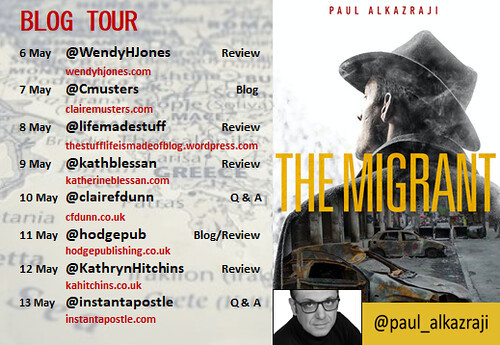Paul Alkazraji's Blog - Posts Tagged "racism"
Road trip with 'The Migrant'
A case of mistaken identity
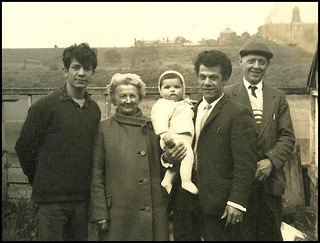
As I cycled along a city ring road once, my saddle was grasped from behind. A youth on a bike with cow horn handlebars scraped his shoe along the tarmac as he dragged us both to a standstill. He simply stared at me.
“What do… you want?” I said. He didn’t offer a word. His fist then slammed into my nose. He yanked back on his cow horns and wheelied off.
In the wake of the Black Lives Matter protests following the death of George Floyd, many previously silent people have given voice to their own experiences of racism. Like other mixed-race children growing up in England, I too felt a measure of it.
Another time, when I found a school door was locked, I tapped on the glass at a passer-by to let me in. He opened the door, showered me with a face full of spittle, locked it again and walked off. Sometimes, motives for actions were not stated; on other occasions, however, they were verbalised with venom.
I was aware then, though, that many English children were mistreated, often worse than me, for being different in some other way. Though my own experiences hurt, they were far outweighed by the friendship, help and affirmation I received from others in England as I grew up. Everyone needs to learn to forgive those who sin against them, as our own thoughts, words and deeds against others are forgiven.
When as an adult I moved to live and work with the church in Albania, I experienced racism from another angle: how some Greeks view those from their neighbouring country. When one Greek filling-station attendant eyed my Albanian car registration plate, I was actually refused petrol. I am stopped and questioned constantly by the Greek police on motorways, at road-toll stations and in supermarket car parks. Then, a cheerful ‘good morning’ and an offering of my British passport noticeably changes their attitude and my treatment.
This brings its own particular feeling of mistreatment: of being mistaken for something you know you are not. It perhaps gets to the crux of the matter: being seen as inferior, less human, potentially criminal even, on the basis of a wrong assumption. It has certainly made me more sympathetic to Albanians.
Many of these incidents of ‘mistaken racism’ were reworked into a novel I wrote called ‘The Migrant’. It tells the story of an Albanian youth who sets off to Greece in search of work and a better life, and three friends who set off to Athens to find him. There they encounter police brutality and casual racism on the roads, as well as populist rallies and organised attacks by a resurgent far right group.
On their way home, as the characters lament such struggles, they talk of a time and place where people of every race and nation will be welcomed and equally valued: where there will be no more crying and pain. Until then, there is longsuffering for so many, but it is eased with a sweet and certain hope that this place is prepared for us - and that we will get there.

'Racism... that's illogical captain!'
Paul Alkazraji's novel ‘The Migrant’ is published by Instant Apostle.
Find copies of ‘The Migrant’ here: https://www.amazon.co.uk/gp/product/B...

'The Migrant' Novel - Q and A
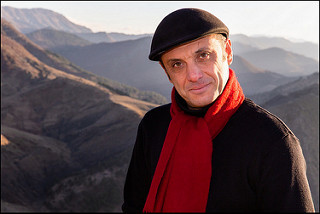
The author Paul Alkazraji in the Albanian mountains
close to the border with Greece. Pic: Andrew LaSavio.

Where does the story begin?
In the spectacular forested mountains bordering Albania and Greece, close to Little Prespa Lake, at dusk. A young Albanian man, Alban, and his friend, sneak past a watchtower to enter Greece illegally in search of work, but they are spotted by a border guard and a chase to catch them begins.
What is the story about?
It is about a pastor, Jude Kilburn, who takes on the responsibility to care enough for another person in his village, the young man, Alban, that he is ready to go the extra kilometre, over 500 of them in fact, to Athens to see if he is safe.
What happens in Athens?
Jude arrives in the Greek capital as dangers all around Alban are building - violent anti-austerity riots, the rise of far right political groups and racist attacks, the clutches of a trafficking gang, and a cynical police operation - then races against time to find him.
Did you personally make the journey in the story from Albania to Athens?
Yes, I drove down through Greece myself in an old Mercedes with two companions to experience the sights and sounds of the country, past Mount Olympus and Delphi. I then spent time in central Athens, in Plaka and Exarcheia, so I could evoke a keen sense of time and place as a backdrop.
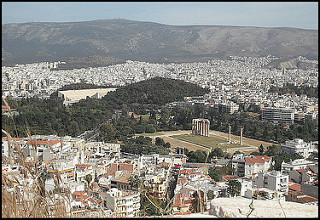
The view across Athens from the Acropolis.
What inspired you to write it?
I have worked for some years in Albania, and seen first-hand the struggles and risks many Albanians face to escape poverty and unemployment and find work abroad. It is, in a way, their story I am telling.
What are its themes?
It deals with people searching for a better life, without poverty or violent conflict, with migrants of the recent mass-movements up through southern Europe, and with dreams that turn sour. It deals too with where our final hope lies for finding such a destination of prosperity and peace.
Do you have a favourite scene from the book?
There are scenes on the Acropolis and in the middle of a riot in Syntagma Square and more that I hope are vivid enough to immerse the reader totally in energy of the moment.
Do you have a favourite minor character?
Some of them would be ‘Che’ Chaconas the anarchist, Granit Korabi the criminal gang member, and Stavros ‘The Big Man’ and Neo-Hellenic Front member. But the protagonist, Jude, the pastor who takes on the search for Alban, has more of my personal empathy.
Do you have a favourite sentence from the book?
The life of the poet Lord Byron has parallels with Alban’s life, and I have quoted him a few times. This one from ‘Don Juan’ is a favourite: ‘Between two worlds life hovers like a star, twixt night and morn, upon the horizon's verge.’ It sums up the story.
Can we guess the ending?
There is a kind of justice in what happens in the epilogue. Originally, it wasn’t planned that way, so I didn’t! The scene was added later. But maybe you will guess it?
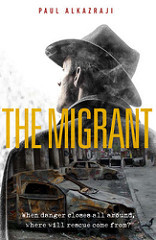
Amazon links to 'The Migrant':
UK: https://www.amazon.co.uk/Migrant-Paul...
US: https://www.amazon.com/gp/product/B07...
'The Migrant' blog tour 2021

'The Migrant': Three incompatible characters set off from Albania on a dangerous journey to find a missing relative in Athens at the time of Greece’s economic crisis, encountering police brutality, racism and restored relationships along the way.
Follow the blog tour here as seven writers share their thoughts about the novel...
Blog Tour #1 'And what... makes this novel so good, well to start with its the main character, Pastor Jude Kilburn as he is taken through a perilous journey...' says Lynsey Adams. (Scroll down a little.)
https://readingbetweenthelines4067781...
Blog Tour #2 A very thoughtful and engaged review from S C Skillman. @scskillman
https://scskillman.com/2021/09/07/boo...
Migrants make for the mountains

Albanians heading for the mountains. Pics, Peter Wilson.
Excerpt from 'The Migrant' novel: A suspense story about a British Pastor, Jude Kilburn, as he travels to Athens to find an Albanian member of his church, Alban Gurbardhi, who has migrated there illegally in search of a better life. This as the riots surrounding Greece’s recent economic collapse explode, and a neo-Nazi movement closes in for a fatal, racist attack on Alban.
From Chapter 1.
Context: Alban Gurbardhi and his friend Ervin run into trouble as they attempt to cross the border illegally between Albania and northern Greece in search of work.
Ten minutes later, he was following the ravine back upstream until he could make out the arch of the stone bridge ahead of him. The sound of Ervin screaming and pleading had grown louder. He winced. He crawled closer on his front up a bank and set aside his sack. He peered over the edge of the clearing and he saw his friend being held by his shirt at the neck. The policeman flung him down and kicked him. Ervin moaned and rolled over.
Sliding back down lower, Alban closed his eyes. He thought about what he could do. He opened them and looked at his hands. They were trembling. He saw a broken branch by his side. It looked thick but dry and rotten. He stretched his hand towards it, and with the tips of his fingers pulled it closer and into his palm. He eased himself onto his back and began to breathe deeply. He saw his breath steam rise high in gusts. He looked up at the millions of stars in the clear Balkan night above him. In his field of vision the policeman suddenly entered and stood looking down on him. For a split second he saw his broad, muscular shoulders, his hair sheared close across his temples, and his eyes – yet one was odd. In fear and panic he brought the branch up into the man’s face and it smashed there into pieces. The man groped at his eyes and tumbled down the bank.
Alban got to his feet, grabbed his sack and ran towards Ervin. He pulled him up off the ground and looked at his face. It was dark and blood-sticky.
‘Hey, friend. Are you coming with me to Greece?’ he shouted. A grin broke across Ervin’s dazed face. Alban clutched his shirt and dragged him forwards, stumbling over the clearing. They tore down the edge of the treeline together. Soon they were running parallel to the ravine. Alban’s sack caught a branch and was snagged from his hand. He stopped to retrieve it. He looked back. The policeman was up now and coming.
They came to a rocky hillock and bounded up it like young goats and then down the other side into a hedge of rosehip bushes. Ervin waded through them ahead lifting the long fronds aside so that they would not snap back on him. Alban, though, felt the thorns of one cut into the flesh of his shoulder and he cried out. They tumbled out of the other side onto the grass and crawled forward until they came to the edge of the land. Alban looked down. Below them was an almost sheer bank of earth falling to the rocky bed of the stream perhaps fifty metres down. He looked out over the mountains before them. The moonlight caught a row of wind turbines on a distant ridgeline. He could smell Ervin’s sweat and blood. He thought he heard the bear growl far away, but he was sure he heard a man grunt and spit. He turned to look behind them. On the top of the hillock the policeman stood against the stars. He reached his hand down to the holster on his thigh and drew out the fat, black pistol.
‘You little dogs!’ he shouted. He mounted it across his right forearm with his left hand. Alban grabbed his friend’s arm and dragged him over the edge as two shots cracked out and echoed along the ravine.
Copyright Paul Alkazraji, Instant Apostle.
The first two chapters can be read here:
https://read.amazon.com/kp/embed?prev...
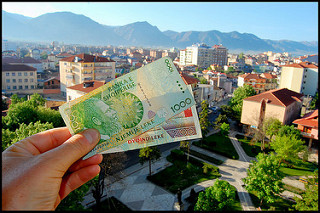
A good day's wage in Albania (1200 leke/£8.40) making work over the border in Greece a prospect many see as worth taking risks for.
For more about 'The Migrant' click on the cover:

The Albania to Athens quiz
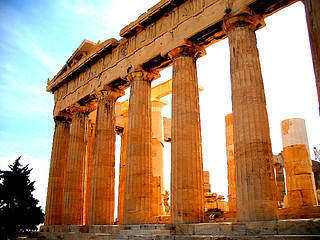
Check your general knowledge of Albania and Greece. Try this free, easy quiz on Goodreads drawn from my novel ‘The Migrant’.
What is the road border crossing from Albania to Greece (near Bilisht) called by people on the Albanian side?
Who was the Prime Minister of Greece in September 2012 when events in the story are set?
The quiz is here: https://www.goodreads.com/quizzes/113...
From Albania to the English Channel

Albanians heading for the mountains. Pics, Peter Wilson.
Just why are so many young Albanian men crossing the English Channel on small boats? Their story is paralleled in Alban’s, caught in rural poverty, and heading first for Greece in ‘The Migrant’ novel.
https://www.goodreads.com/review/show...
From Chapter 1.
Context: Alban Gurbardhi and his friend Ervin run into trouble as they attempt to cross the border illegally between Albania and northern Greece in search of work.
Ten minutes later, he was following the ravine back upstream until he could make out the arch of the stone bridge ahead of him. The sound of Ervin screaming and pleading had grown louder. He winced. He crawled closer on his front up a bank and set aside his sack. He peered over the edge of the clearing and he saw his friend being held by his shirt at the neck. The policeman flung him down and kicked him. Ervin moaned and rolled over.
Sliding back down lower, Alban closed his eyes. He thought about what he could do. He opened them and looked at his hands. They were trembling. He saw a broken branch by his side. It looked thick but dry and rotten. He stretched his hand towards it, and with the tips of his fingers pulled it closer and into his palm. He eased himself onto his back and began to breathe deeply. He saw his breath steam rise high in gusts. He looked up at the millions of stars in the clear Balkan night above him. In his field of vision the policeman suddenly entered and stood looking down on him. For a split second he saw his broad, muscular shoulders, his hair sheared close across his temples, and his eyes – yet one was odd. In fear and panic he brought the branch up into the man’s face and it smashed there into pieces. The man groped at his eyes and tumbled down the bank.
Alban got to his feet, grabbed his sack and ran towards Ervin. He pulled him up off the ground and looked at his face. It was dark and blood-sticky.
‘Hey, friend. Are you coming with me to Greece?’ he shouted. A grin broke across Ervin’s dazed face. Alban clutched his shirt and dragged him forwards, stumbling over the clearing. They tore down the edge of the treeline together. Soon they were running parallel to the ravine. Alban’s sack caught a branch and was snagged from his hand. He stopped to retrieve it. He looked back. The policeman was up now and coming.
They came to a rocky hillock and bounded up it like young goats and then down the other side into a hedge of rosehip bushes. Ervin waded through them ahead lifting the long fronds aside so that they would not snap back on him. Alban, though, felt the thorns of one cut into the flesh of his shoulder and he cried out. They tumbled out of the other side onto the grass and crawled forward until they came to the edge of the land. Alban looked down. Below them was an almost sheer bank of earth falling to the rocky bed of the stream perhaps fifty metres down. He looked out over the mountains before them. The moonlight caught a row of wind turbines on a distant ridgeline. He could smell Ervin’s sweat and blood. He thought he heard the bear growl far away, but he was sure he heard a man grunt and spit. He turned to look behind them. On the top of the hillock the policeman stood against the stars. He reached his hand down to the holster on his thigh and drew out the fat, black pistol.
‘You little dogs!’ he shouted. He mounted it across his right forearm with his left hand. Alban grabbed his friend’s arm and dragged him over the edge as two shots cracked out and echoed along the ravine.
Copyright Paul Alkazraji, Instant Apostle.
The first two chapters can be read here:
https://read.amazon.com/kp/embed?prev...

A good day's wage in Albania (1200 leke/£8.90) making work over the border in Greece and in Northern Europe a prospect many see as worth taking risks for.
For more about 'The Migrant' click on the cover:

With Ruth O Reilly Smith in the UCB2 studio
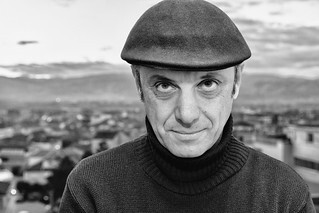
An in depth chat with Ruth O Reilly Smith in the UCB2 studio covered cross-channel migration by Albanians, ‘The Migrant’ novel, why the future once seemed like choosing a cereal brand from a supermarket shelf, and why Robin Mark’s ‘Days of Elijah’ speaks to me. Click on the link for 27/03/2023
https://www.ucb.co.uk/ruth
By this author.

Tasters from ‘The Migrant’ novel.
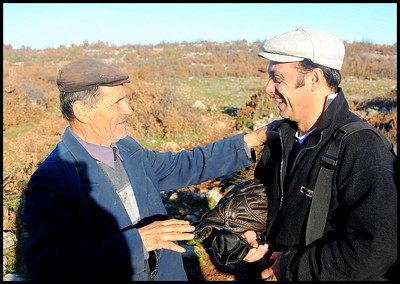
A pastor sets off on a dangerous journey to find a missing Albanian member of his church in Athens at the time of Greece’s economic crisis, encountering police brutality, racism and restored relationships along the way.
In an Albanian village. (Chapter 2.)
As the route became tarmac, an old man in a blue cloth
cap sat on an upturned milk crate at the gate of his yard.
He scrutinised Jude and raised his hand in a clenched fist
salute to greet and halt him.
‘Death to fascism!’ he shouted.
‘Freedom for the people,’ Jude called back to humour
him. He knew old Fatos had at one time been the village
headman, and still kept up his self-appointed monitoring
duties.
‘Where is your permit to be here?’ said Fatos.
‘Where is your permit to ask people if they have a
permit?’ asked Jude. The man slapped his knee and
laughed. ‘How are you, Fatos? And everyone in your
house?’
‘Mirë, mirë,’ he said. Jude walked over and smiled at him
as he shook his hand, and kept on moving. He then spun
around and saluted him again with his fist. The man
grinned broadly.
On the roads south through Greece. (Chapters 7 and 9).
Soon they were through Kozani and driving out in open
country, and Jude watched the scenery slide by. There
were solar panels the size of billboards in fields flashing in
the midday sun. A lorry was parked with the entire cabin
tilted forwards as if it had expired in the heat. As they
climbed into the hills, they passed clusters of Orthodox
shrines along the roadside like rusty mailboxes. One was a
perfect miniature church with red roof tiles and a bell
tower.
South of Larissa the landscape began to change. Jude
watched an irrigation machine like a giant stick insect
creeping over a field, and a tractor racing across another,
raking up a dust cloud behind in a brown jet stream. They
passed a meadow of green grass that rolled up to its crest
in a wave where a single cypress tree flew there like a
standard. It reminded Jude a little of Salisbury Plain in
England, and he half-expected a tank to rise up at the
roadside on war manoeuvres.
They drove on in an atmosphere that had warmed, Jude
thought, a few degrees. They came over a pass and to a
long, winding descent past walls with huge red slogans for
the Greek Communist Party. They drove by Eleonas, a
village of white houses above an escarpment of orange-tinged
rocks, and down through olive orchards with long
avenues of gnarled trunks. As they climbed towards
Delphi, the cypress trees lined the road like javelin heads,
and when they passed its sanctuary of Apollo, a place
pagans once thought of as the navel of the world, the light
was beginning to fade with the sun.
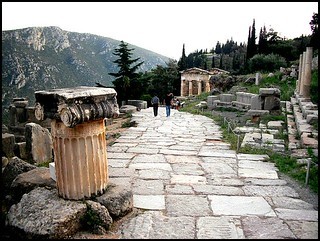
In Athens (Chapters 12 and 16).
Omonia.
They walked under a graffiti-soiled colonnade
where women in hijabs crouched around babies in
pushchairs, and there Jude noticed a sign above a door that
read ‘St Kolbe’s Refugee Programme’.
‘Let’s see if our spiritual cousins might help us,’ Jude
said to Mehmed. On the third floor in a dimly lit, spartan
office they were eventually given entry to the room of a
Father O’Toole, as the name read on the door.
‘Are you relatives?’ he said in the soft, arching lilt of
southern Ireland as he squinted a little at the photo.
‘I’m his pastor,’ said Jude. ‘We’re from Albania – and
you, Cork?’
‘Galway … You don’t look like a pastor,’ he said
smiling. ‘You look like a Romantic poet. Shelley or one of
them … or something.’
‘We have no union card. I could recite the Beatitudes to
you?’
‘That won’t be necessary,’ he said, laughing, and
pushed his lank, grey hair behind his ear. ‘And your friend
– is he Mafia?’ He glanced at Mehmed.
‘He’s a church elder.’
‘Oh, God save us from you Protestants. And you’d be
looking for your lost sheep here like a good fella, would
you?’
‘In a nutshell.’
---
Acropolis.
Now is not the time,’ said Mehmed. ‘Look there.’ Jude
followed the line of Mehmed’s sight until he saw four men
walking through the trees on the approach path to the
Propylaea steps and ramp. The second man wore a red
baseball cap and the first had an unmistakably thick neck
and a black bandana. ‘We did not lose them yesterday,’
Mehmed said, glancing up the steps behind him. ‘They’ve
picked their time and place, Jude, and caught us well, with
no exit. Come on … quickly.’ Mehmed pulled him
forwards and they set off striding up the steps onto a
wooden boardwalk. As they broke into a run, Jude heard
the heavy clump of his footfall passing by the weatherworn
stone columns, and it seemed to call unwanted
attention to them. Mehmed was propelling himself
forwards by the metal handrail. Soon, they were on a
gravel path running on to the citadel hilltop past the long
line of honey-hued Doric columns that formed the
towering Parthenon temple.
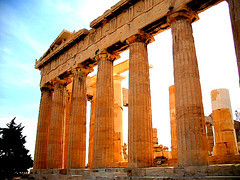
From ‘The Migrant’ © Paul Alkazraji 2019, Instant Apostle.
Read Chapter 1 of ‘The Migrant’ here:
https://instantapostle.com/2019/02/22...
Find copies of ‘The Migrant’ here: https://www.amazon.co.uk/gp/product/B...

My book @ bedtime ‘The Migrant'

Catch the bedtime tweets here just for this week. https://twitter.com/paul_alkazraji
Likes and RTs entered for a chance to win a copy.
'The Migrant': Three incompatible characters set off on a dangerous journey to find a missing relative in Athens at the time of Greece’s economic crisis, encountering police brutality, racism and restored relationships along the way.
From ‘The Migrant’ © Paul Alkazraji, Instant Apostle.
Read Chapter 1 of ‘The Migrant’ here:
https://instantapostle.com/2019/02/22...
Find copies of ‘The Migrant’ here at £1.99 on Kindle: https://www.amazon.co.uk/gp/product/B...


